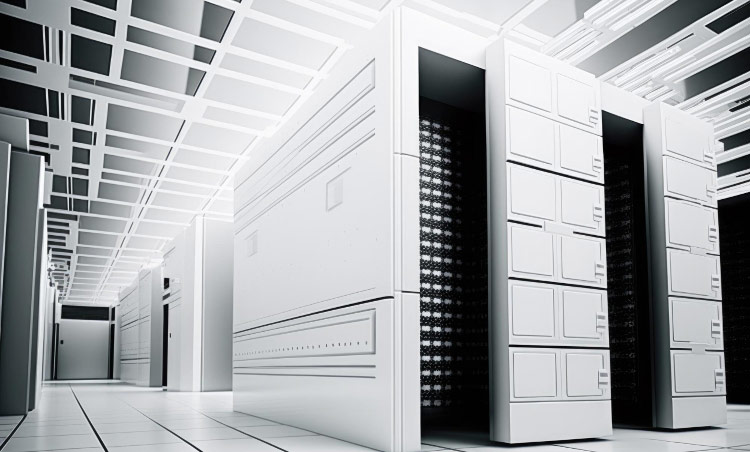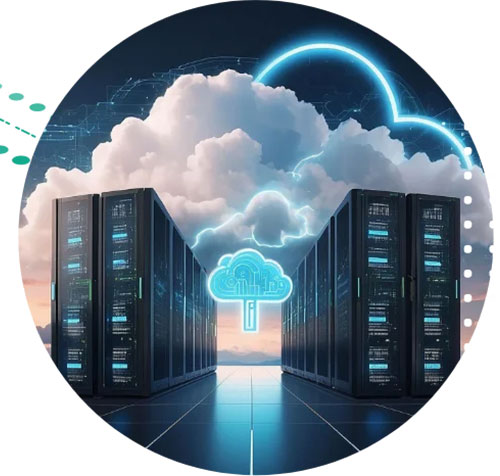AI-Ready Data Centers: Powering The Future-Ready BFSI
SPEAKERS:
Shipra Malhotra, Managing Editor, ISMG (Moderator)
Girish Dhavale, CTO – Data Center Services, Sify Technologies Ltd.
Gitesh Mahajan, Business Head, Data Center Services, Sify Technologies Ltd.
Dr. N Rajendran, Chief Digital Officer, Multi Commodity Exchange
Anirban Guha, Head of Risk Analytics, Aditya Birla Financial services Ltd.
DATE:
June 14, 2024 | 3:00 PM
DESCRIPTION:
The BFSI industry is undergoing a paradigm shift as traditional banking and financial services models give way to more agile, flexible and tech-driven business models with customer experience at the core. As BFSI companies accelerate their digital transformation drive to fuel continuous innovation and seize new market opportunities, their reliance on data centers has grown exponentially.
But how equipped are data centers to accommodate the advanced computing, data-centric and AI-ready infrastructure requirements of today’s modern BFSI workload? Managing vast data volumes to support real-time decision-making and agile operations demands advanced capabilities that accommodate fluctuating market demands, innovations, rapid expansion and flexibility while safeguarding sensitive data.
An efficient, scalable, secure, sustainable, and interconnected data center design necessitates dynamic scaling, highly reliable network and connectivity, robust business continuity, and strong security and governance mechanisms.
For IT leaders in the BFSI industry, investing in future-ready data centers is not merely a technological upgrade but a strategic imperative to position themselves at the forefront of innovation, ready to capitalize on the opportunities presented by the digital age.
The Benefits of Colocation Data Center Management for Enterprises
Data centers have evolved into becoming a crucial component of the digital IT infrastructure of many global enterprises today. The demand for data center services in India is experiencing remarkable growth as enterprises aim to deliver superior customer experience, accelerate innovation, and become digitally enabled.
According to 6Wresearch, the data center market in India is expected to grow at a CAGR of 10.7% during 2021-2027. This growth can be attributed to key drivers such as the Indian government’s push towards digitalization, increasing Internet penetration, data sovereignty, accelerated cloud adoption, increasing usage of IoT, and the rollout of 5G. Similarly, according to GlobeNewswire, the value of the data center market in India is expected to rise to $10.09 billion by 2027 at a (CAGR) of 15.07% in the period of 2022 to 2027.
Managing a data center in India is getting more intricate by the day in today’s digital landscape. Enterprises find managing data centers to be complex and time-consuming. They need professional expertise, substantial budgets, and excellence in IT infrastructure execution to manage data centers. To meet the evolving digital demands and ensure business continuity, enterprises are now resorting to colocation, i.e. outsourcing of data center management to professional service providers. This delivers cost savings and a range of benefits, including access to subject matter experts, improved operational efficiency, agility, scalability, risk mitigation, enhanced security, and compliance with industry regulations.
To know more about Sify’s colocation data center services read here: Colocation data centre
Advantages of colocation of data center management
Here are a few advantages of colocation of data center management for enterprises:
- Cost Savings: Building and maintaining a data center requires significant capital investment and operational expenses. By leveraging the model of colocation of data center management, enterprises can transfer these costs to a service provider that has already invested in infrastructure, equipment, and personnel. This empowers enterprises to free up capital that can be redirected toward other strategic initiatives. Additionally, it can help businesses avoid losses incurred from downtime and data breaches in the long run. Moreover, colocation positively impacts Water Usage Effectiveness (WUE) and Power Usage Effectiveness (PUE) by promoting improved energy efficiency. Utilizing the capabilities of Artificial Intelligence and Machine Learning, data centers can experience savings of up to 8% to 10% on PUE. This not only contributes to environmental sustainability but also helps enterprises meet their energy efficiency goals, while maintaining optimal performance and increased savings.
- On-demand Scalability: When a business grows, its IT requirements change significantly and may require additional space, computing power, and capacity. Colocation enables enterprises to easily scale up or down as per requirement without incurring additional capital expenses or disrupting their business operations. Data Center service providers can quickly deploy new servers, storage, and network infrastructure or adjust existing configurations to meet changing business needs.
- Automation and AI/ML: Implementation of AI/ML requires careful consideration across multiple parameters. Providers of colocation data center management services can handle large volumes of data, integrate with existing solutions, and enable predictive maintenance, which ultimately helps enterprises gain deeper insights for faster decision-making, automating processes, and delivering increased efficiency & security.
- Access to Subject Matter Experts (SMEs): Colocation of data center management gives enterprises access to subject matter experts who possess specialized knowledge and experience in data center operations. They come with skills, guidance, solutions, and recommendations that can help enterprises optimize performance and minimize risks as well as free up internal resources for performing core business operations.
- Enhanced Data Security: Data security has always been a major priority for enterprises. With data dispersed across multiple touchpoints in a hybrid work model, enterprises need a multi-layer security framework. Service providers ensure comprehensive security measures across the physical security of a DC and the data hosted across on-premise, colocation, or edge to cloud. Specialized service providers come with the expertise and systems to meet industry regulations, protect sensitive data, and minimize compliance risks. Enterprises must make sure that service providers offer:
- A designated Security Operation Center (SOC) to ensure robust and resilient security
- Faster intrusion detection and prevention through multiple protocols
- Data backup and recovery in different seismic zones
- Compliance with the latest data privacy regulations and industry standards
- Adherence to Service-Level Agreements (SLAs): By adhering to the pre-defined SLAs, enterprises can enjoy benefits such as improving operational excellence, accountability, performance monitoring, risk mitigation, and cost optimization. SLAs also ensure service providers deliver the expected quality of service, provide regular reports and establish procedures for addressing issues and non-compliance penalties, which benefit enterprises.
- Improved Reliability and Business Continuity: Colocation enables enterprises to improve reliability and business continuity through specialized expertise, scalability, planning, and improved security measures. Enterprises can leverage the experience of service providers, scale resources efficiently, and solve issues proactively. This ensures there are no disruptions in business operations.
- Constant Technological Advancement: The colocation of data center management provides enterprises with constant technological advancement, including cloud on ramp capabilities. Service providers offer expertise in emerging technologies, regular infrastructure upgrades, access to cutting-edge technology, flexibility, and smooth integration through private direct connections to the cloud. It allows enterprises to be resilient and future-ready without compromising on technology and connecting their on-premises infrastructure to cloud computing systems.
Evaluate your data center needs to make the right choice
When an enterprise identifies a service provider for data center management services, it must evaluate its options based on its unique business objectives and digital priorities. Enterprises must go beyond the basic minimum criteria and focus on key differentiating factors. They must choose a service provider that focuses on:
- Cloud vision and strategy
- Hyperscale partnerships
- End-to-end managed services across multi/hybrid cloud environments
- Interconnect services to other sites and partner ecosystems
Colocation of data center management can be a valuable strategy for enterprises looking to maximize their IT resources and stay competitive in today’s rapidly-advancing digital landscape.
Sify Technologies has been providing reliable and robust data center services for the last 22 years, with a razor-sharp focus on innovation and new technologies. With the objective of delivering delightful experiences, enhanced efficiency, and desired outcomes to our customers, we have equipped all our data centers in India with automation through AI/ML capabilities. This has resulted in creating a sustainable ecosystem of connected data centers. We offer enterprises benefits such as zero downtime, reduced capital expenditure and operational expenditure, and around-the-clock support through our bankable digital data center infrastructure. Our efforts have delivered up to 20% improvement in the turnaround time to deliver critical projects.
What’s more! We also help enterprises realize up to 300 person-hour savings every month by automating customer billing. Our predictive approach to maintenance helps enterprises realize up to 20% reduction in MTBF, up to 10% improved MTTR, and up to 10% reduction in potential downtime. We comply with all the global standards and policies to prevent enterprises from penalties due to non-compliance.
Learn how our state-of-the-art data centers enable enterprises to achieve their desired business goals.
Future of Data Center: Architectural Advances
Data is growing at an exponential rate in the modern borderless world. Over 2.5 Quintilian bytes of data is generated every day across the globe. India alone is set to produce 2.3 million petabytes of digital data by the year 2020, and it is growing at a rate that’s much faster than the world average. Many enterprises are also exploring online data backup in the cloud further fueling this data explosion.
This data explosion increases the demand for storage capacities that are served by Data Centers. In just two decades, Data Centers have scaled up from the size of a room to the size of a commercial tower giving way to accommodate this increased storage need. Besides storage, modern Data Centers are also sprucing up to handle more services. They are more connected than ever and can meet the needs of the contemporary business world. New solutions have emerged around Data Center architecture that can bring competitive advantages to users through more optimized performance. Data Centers have now become critical components of a modern IT infrastructure.
In India, we see emerging businesses growing at a fast pace, with cloud computing technologies and cloud warehouses taking the lead to store enormous amounts of digital data. At the beginning of the 21st century, most organizations in India had captive Data Centers that were self-managed. With advances introduced in cloud technologies and specialized players adding more capabilities, the self-managed option was replaced by the outsourcing model. Increase in the users, economic growth of the country, and cost advantages of cloud-based Data Centers are some of the trends driving adoption of a cloud-based architecture. Captive Data Centers are expensive to accommodate and challenging to scale. However, cloud-based Data Center architectures are more flexible.
Many new technologies, services, and facilities that were premium and rare earlier are now part of standard offerings in modern Data Centers. These services are reshaping the way businesses operate today.
Another trend to note is the emergence of Modular 4th generation Data Centers. These Data Centers comprise modular units that help in quickly scaling up the infrastructure. In addition to the components in the racks being modular, the building itself could be modular. For instance, some Data Centers are built in shipping containers. Scaling up means adding more shipping containers with Data Center units.
Resolving the Challenges
Many challenges of the past have now been resolved with architectural advances in the Data Center space. For instance, Pod architecture for SaaS assigns a set of machines to a specific job or customer for all of its required tasks. To create redundancies for power and cooling in a Data Center, a lot of assembling needs to be done which can incur a cost. You may also need to construct additional racks. However, POD comes with frames that are free standing and compatible with most equipment so it can be used for all needs including power, cooling, and cabling. So, your need for construction within the Data Center facility is minimized. It can simplify infrastructure scaling to support your digital growth. It is a standardized deployment that can automate user provisions. It allows you to use shared storage, firewall, and load balancing while customizing individual PODs as per your business needs. When scaling up users, you would not need to perk up your whole infrastructure but only add or remove specific resources user-by-user, which can help reduce overheads.
While Data Centers serve as an ideal place to use your critical applications, operating them has been a big challenge in the past. A Data Center is affected by many environmental factors that add inevitable complexities. A Data Center operator needs to take care of the cooling needs of Data Centers as well as maintain correct levels of air and humidity in the storage spaces. These challenges make it worthwhile for companies to try cloud-based shared storage space managed by third-party experts who could be better equipped to counter these problems. In modern warehouses, Computer Room Air Conditioning (CRAC) device is used instead of traditional air conditioning, which can monitor as well as maintain humidity, air flow, and temperature in a Data Center.
The future is smart!
The future of the Data Center is smart: modern Data Centers are now offering converged infrastructure, and the trend is further moving towards hyper-convergence. This has brought many advantages for Data Center operations and has also solved problems that paralyzed companies earlier. The risk of hardware failure, for instance, plagues companies with the risk of losing data and they struggle to rebuild their infrastructure. Siloed approaches to managing servers was another challenge that made Data Center operations expensive and complicated. With converged infrastructures, the process of managing a Data Center gets organized; with a single interface used for infrastructure management, your company turns more proactive in streamlining your operational processes and in keeping your data on the cloud safe.
While consolidation of operations through convergence makes management easier, most servers are still siloed, and that is where hyper-convergence plays its magic. Hyper-converged Data Centers are software-defined Data Centers that are also called smart Data Centers. They use virtualization and converge all operational layers including computing, networking, and storage into a single box. With hyper-convergence, everything is now on the same server which brings improved efficiencies, reduced costs, and increased control over Data Center components.
Colocation: A trend to watch
Rethink IT, replace captive servers with cloud services. You would now need much less space for storing the same amount of data than you needed in a captive Data Center. Welcome to the concept of managed colocation!
Colocation services (or Colo) are delivered by Data Center solution providers to enhance user experience. A hybrid cloud drives them and provides specialized services for their users. A collocation is a place where customers have better control over their private infrastructure, and with increased proximity to the public cloud, they can also be closer to their customers.
A colocation service relies on the principles of abstraction, software-based provisioning, automation, unified management, and microservices. Colo facilities are highly flexible as it can reap the advantages of both private and public cloud with a hybrid infrastructure. While private cloud gives enhanced security and control, the public cloud makes it easy to transport data over encrypted connections and gives you additional storage space.
Modern colocation services are now shifting to Data Center-as-a-Service (DCaaS) which is a much more flexible deployment than Software as a Service, Platform as a Service, and Infrastructure as a Service models. A hybrid DCaaS colocation architecture has a public IaaS platform, on hosted or on-premise private cloud and a Wide Area Network (WAN) to connect the two. A major advantage of DCaaS is the change in the cost equation. DCaaS providers have high economies of scale that allow them to offer you volume-based discounts taking your costs down. The DCaaS hybrid cloud architecture not only provides hybrid storage flexibility and cost advantage but also other benefits like increased redundancies, improved agility, and maximum security.
A hybrid cloud combines the resources available to you on the private cloud and the public cloud and gives you the flexibility to seamlessly move your data between them. With changes in your cost structures and business needs, you can flip your resources between the two clouds anytime. If you’ve reached the designed capacity of your current private cloud, you can always switch to a Public cloud for further expansion. For instance, Cloud bursting can give you on-demand storage over the public cloud so that you can shift the increased burden on your private cloud to the public in peak business seasons.
Data Center technologies are still emerging, and new architectures like hybrid cloud and hyper-convergence are taking shape. In the future, more companies would realize the benefits of these architectural modifications and will be able to enjoy far higher capacities and advanced Data Center management capabilities.
Sify offers state of the art Data Centers to ensure the highest levels of availability, security, and connectivity for your IT infra. Our Data Centers are strategically located in different seismic zones across India, with highly redundant power and cooling systems that meet and even exceed the industry’s highest standards.





























































